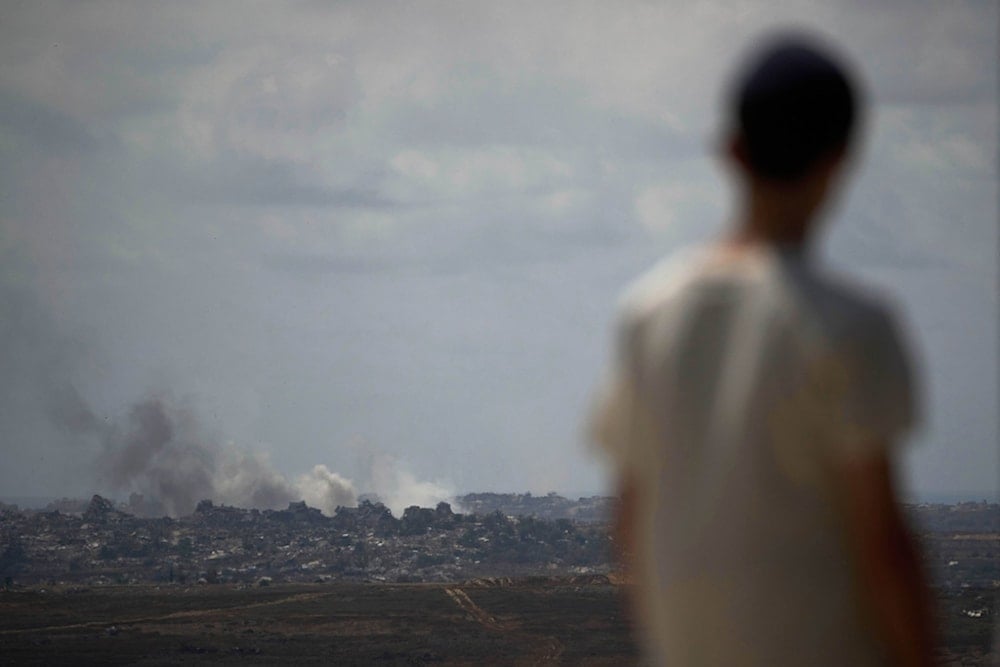Gaza aid turned into tool of war: UN expert
UN Special Rapporteur on the Right to Food, Michel Fakhri, accuses "Israel" of tightly controlling relief efforts in a way that forces civilians to comply with military objectives.
-

A youths observes smoke rising to the sky after an explosion in the Gaza Strip as he visits a sightseeing area in Sderot, southern occupied Palestine, Thursday, May 22, 2025 (AP Photo)
An opinion piece published by writer Michel Fakhri for The Guardian on Thursday has sharply criticized "Israel's" ongoing genocidal campaign and humanitarian blockade in Gaza, describing the situation as a deliberate and unlawful assault on civilians.
Fakhri, the UN Special Rapporteur on the Right to Food, accused Israeli authorities of systematically using starvation as a method of warfare. He cited a dramatic rise in acute child malnutrition and a staggering 3,000% increase in the price of wheat flour, an indication of how basic survival has been weaponized against Palestinians. According to Fakhri, Gaza's population is being subjected to conditions that are "inhumane" and "designed to displace and break" them.
The piece addresses the launch of "Israel's" ground attack, so-called Operation Gideon's Chariots, portraying it as a calculated attempt to secure full and indefinite control over the Gaza Strip. This move comes in open defiance of international rulings, including those by the International Court of Justice (ICJ), which found the occupation illegal and ordered its termination alongside reparations to Palestinians.
Weaponized Aid
A central focus of Fakhri's article is the "cynical manipulation" of humanitarian aid. He accuses "Israel" of tightly controlling relief efforts in a way that forces civilians to comply with military objectives. "It makes aid conditional on political and military aims," he wrote. "It makes starvation a bargaining chip." He condemned these policies as a direct affront to humanitarian law, stating, "Israel is deliberately and unashamedly imposing inhumane conditions on civilians in the Occupied Palestinian Territory."
This analysis is reinforced by revelations from a Financial Times report published the day before, which exposed the details of a US-backed initiative to reroute aid through the Gaza Humanitarian Foundation (GHF), a private Swiss-registered entity operating under Israeli military supervision. Dozens of foreign private contractors, some of them ex-military, have reportedly arrived to manage aid distribution through militarized checkpoints in southern Gaza. The plan sidelines the UN and compels Palestinians to make long, often dangerous, journeys to centralized hubs in order to receive food and medical supplies.
UN officials have widely condemned the project. One unnamed source described it as "a fig leaf for forced relocation." Former World Central Kitchen CEO Nate Mook, whom GHF falsely listed as a board member, denied involvement, reflecting concerns over the foundation's credibility and organizational opacity. As of last week, no confirmed donors had publicly committed to funding the initiative, despite GHF's claims of securing $100 million in pledges.
Famine Politics
According to FT, two US-based security firms, Safe Reach Solutions and UG Solutions, are partnering in the rollout, raising further alarm about the militarization of aid. While GHF insists the distribution will be "managed exclusively by civilian teams," humanitarian organizations and the UN have warned that the model violates principles of neutrality, impartiality, and humanity.
The piece also notes that the World Food Programme and World Central Kitchen have both suspended operations due to Israeli restrictions. Hundreds of UN aid trucks remain stalled at Gaza's borders, while civilians face worsening famine. UN humanitarian chief Tom Fletcher described the situation bluntly at the Security Council: "It makes starvation a bargaining chip."
Faced with the Security Council's paralysis, largely due to US vetoes shielding "Israel" from accountability, Fakhri called on the UN General Assembly to invoke the "Uniting for Peace" resolution, which would enable peacekeepers to escort aid convoys into Gaza without requiring Israeli consent.
Read more: Netanyahu ties Gaza war end to Trump relocation plan
He concluded with a warning that diplomatic appeals and symbolic gestures are no longer sufficient. "At this point, unsubstantiated political threats and suspended trade negotiations ring hollow," Fakhri wrote. He urged immediate, decisive action to end the collective punishment of Gaza's 2.3 million people.

 4 Min Read
4 Min Read










